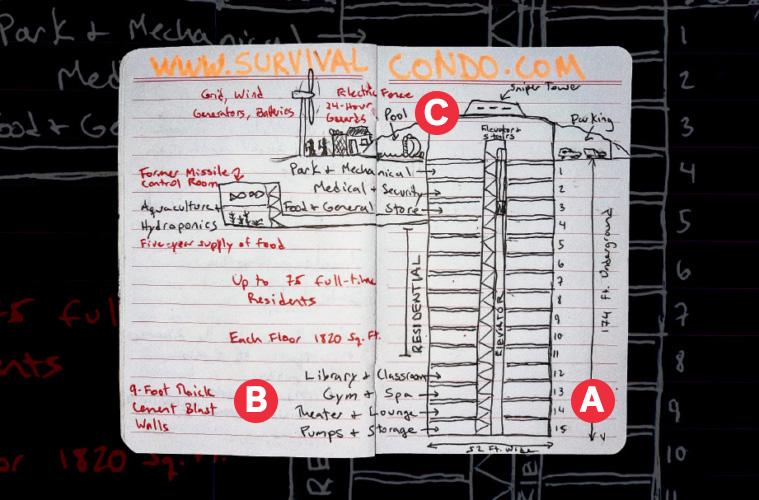Professor Teo Ballvé is doing ethnographic research on survivalists.
In case of a catastrophic event — a natural or manmade disaster — the luxury Survival Condo, located underground in the middle of Kansas, offers a contingency plan for survivalists. Also called doomsday preppers, some of these individuals who are preparing for extreme emergencies are purchasing off-the-grid living spaces in this Kansas condo as well as other locations. “Personalized disaster prep has grown into a multimillion-dollar business,” according to the New York Times.
“There are all kinds of things they list as potential threats that this would be perfect for: solar flares, political civil unrest, nuclear disaster, super volcano,” explains Teo Ballvé, an associate professor of geography and peace and conflict studies who has been doing ethnographic research on survivalists.
Ballvé visited the Survival Condo last March, when he went to Denver to serve on a panel discussion about far-right politics at the Association of American Geographers conference. “I finished my panel around 4:30 p.m. and drove nine hours to Kansas,” he remembers, to meet one of the condo’s project managers.
(A) Converted from a former military nuclear missile silo, the condo extends approximately 200 feet — 15 floors — underground. Each floor is 1,820 square feet, the concrete walls are 9 feet thick, and the facility is designed to sustain 75 people for more than five years.
The professor first started thinking about survivalism while teaching Environmental Security, a cross-listed geography and peace & conflict studies course he’s been teaching since 2015. The class discusses environmental change and the potential for political instability. In 2018, to hear firsthand from a prepper, Ballvé posted a message on the neighborhood community app NextDoor Hamilton asking for someone to provide this perspective to his class. “This wasn’t a tongue-in-cheek, ironic sort of thing,” the professor emphasizes. “I’m constantly asking myself to [look at this topic] in an academic way, in terms of analysis, not critiquing,” he says. “[I’m] trying to understand their views on their own terms.”
A local man responded to the post and visited the class twice in consecutive years. “I got to know him, and a bigger relationship emerged,” Ballvé says. The man told the professor, “If you’re really interested in prepping, you should join our group.” Ballvé took him up on his offer and, as part of his meeting attendance, began making his own emergency preparations at home. “The first thing everyone does is go around and say what they’ve been prepping since the last meeting, and this was something I wanted to immerse myself in,” Ballvé says. The timing worked in his favor: When the pandemic began in 2020, he’d stocked N95 masks, hand sanitizer, and toilet paper. “For them, it was total vindication,” he remembers.
(B) Ballvé’s immersive style of research, called participant observation, is a hallmark of ethnographic fieldwork. His project has received two Colgate grants, from the Upstate Institute and the Research Council’s Picker Fellowship. In his notebook, with sketches like this, he organizes his thoughts and brainstorms.
For him, the utility of ethnography is that it’s not necessarily driven by strict research questions and predetermined hypotheses. “It’s usually more open-ended,” Ballvé explains. It’s that open-endedness that led him to join the prepper group in Hamilton and it’s why he ended up 200-feet underground in the middle of Kansas.
(C) The Survival Condo sits in a silo built by the Army Corps of Engineers during the Cold War and was therefore designed to withstand a direct nuclear strike. The facility’s offerings include military-grade security, diesel generators, water reserve tanks, and hydroponic food production.
Units start at $1.5 million and also provide more traditional amenities like an indoor swimming pool, an arcade, a gym, a movie theater, and a library. No one currently lives in the facility because it is for extreme emergencies only, but those who have purchased units do visit it occasionally.
A second condo is being built, according to its website. Just as Ballvé is careful about how he tries to understand survivalists, the site also states that they are not looking for “stereotypical nuts portrayed in movies, but rather like-minded individuals” with the desire to protect their families.
Ballvé — who previously worked as a journalist covering Latin American affairs and U.S. policy toward the region — envisions this project as a narrative nonfiction book one day. “Paranoia in American politics is nothing new and apocalyptic thinking has been with us since at least the Puritans,” notes Ballvé. “But the story of preppers has a lot to tell us about the cynicism and anxieties driving today’s political divisions.”
See how other professors as well as staff members and students have filled their Colgate notebooks in this video welcoming the Class of 2027.

